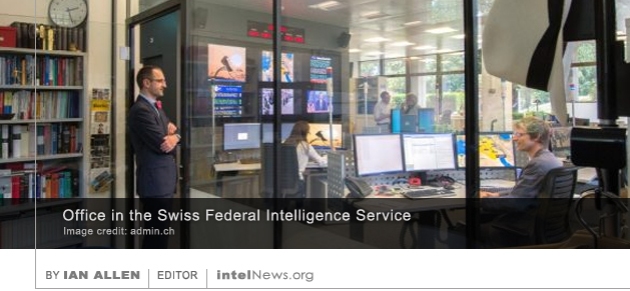Swiss intelligence chief to step down following dispute over Crypto AG spy scandal
May 13, 2021 2 Comments

THE DIRECTOR OF SWITZERLAND’S spy service will step down once his mandate ends in August, allegedly over a dispute with the country’s governing council about the Crypto AG affair, which shook Swiss politics last year. Jean-Philippe Gaudin headed Switzerland’s Military Intelligence Service from 2008 to 2015. He then served as a defense attaché at the Swiss embassy in Paris, France, before being appointed by the then-Defense Minister, Guy Parmelin as director of the Federal Intelligence Service (FIS). Founded in 2010, the FIS performs both domestic and external intelligence functions in the Alpine state.
But, according to reports in the Swiss media, Gaudin is not expected to continue in his post once his mandate ends, on August 31. The reason seems to be tensions within the Swiss government over the so-called Crypto AG affair. The scandal centers on the world’s leading manufacturer of cryptologic equipment during the Cold War, Crypto AG, whose clients included over 120 governments around the world. In February of last year, The Washington Post and the German public broadcaster ZDF confirmed reports that had been circulating since the early 1980s, that Crypto AG was a front for American intelligence. According to the revelations, the Central Intelligence Agency and West Germany’s Federal Intelligence Service secretly purchased the Swiss company in the 1950s and paid off most of its senior executives in order to buy their silence.
The secret deal, dubbed Operation RUBICON, allegedly allowed the US and West Germany to spy on the classified government communications of many of their adversaries —and even allies, including Austria, Italy, Spain, Greece, Jordan, Saudi Arabia and the United Arab Emirates. The revelation about the secret deal shocked Swiss public opinion and embarrassed the government of a nation that bases its national identity and international reputation on the concept of neutrality.
Earlier this year, a parliamentary report into the Crypto AG affair concluded that Gaudin had essentially mishandled the case and had waited too long to inform the nation’s leadership about it. Gaudin’s behavior resulted in tension in his relationship with the Swiss Federal Council —a seven-member executive body that forms the federal government and serves as the collective decision-making body of the Swiss Confederation. According to reports, the spy chief’s relationship with Switzerland’s Defense Minister, Viola Amherd, is beyond repair, and the minister has been pushing for his resignation for several months.
In a statement released on Wednesday, the Swiss government gave no reason for Gaudin’s pending career change, saying only that the spy chief would move on to “new challenges” in the private sector. He will reportedly be replaced by Juerg Buehler, who will serve as interim director of the FIS until further notice. Neither the FIS nor Gaudin have made public comments about this sudden development.
► Author: Joseph Fitsanakis | Date: 13 May 2021 | Permalink
 Officials in Switzerland say new laws enacted in recent months will help them change their country’s image as one of Europe’s most active spy venues. For decades, the small alpine country has been a destination of choice for intelligence officers from all over the world, who use it as a place to meet assets from third countries. For example, a case officer from Britain’s Secret Intelligence Service (MI6) will travel to Switzerland to meet her Algerian agent. She will exchange money and documents with him before she returns to Britain and he to Algeria, presumably after depositing his earnings into a Swiss bank account.
Officials in Switzerland say new laws enacted in recent months will help them change their country’s image as one of Europe’s most active spy venues. For decades, the small alpine country has been a destination of choice for intelligence officers from all over the world, who use it as a place to meet assets from third countries. For example, a case officer from Britain’s Secret Intelligence Service (MI6) will travel to Switzerland to meet her Algerian agent. She will exchange money and documents with him before she returns to Britain and he to Algeria, presumably after depositing his earnings into a Swiss bank account.






Switzerland overrun with foreign spies, Swiss intelligence service warns
June 28, 2023 by Joseph Fitsanakis 1 Comment
Traditionally neutral Switzerland has not joined most other European countries in expelling Russian intelligence officers —posing as diplomats— following Russia’s full-scale invasion of Ukraine in 2022. Therefore, as Russia tries to rebuild its shattered intelligence-gathering networks in Europe, it is using Switzerland as a forward-operating base, according to the FIS. As of 2023, the number of Russian intelligence personnel stationed on Swiss soil, and the ensuing espionage activity, “is notably high”, states the report.
According to the FIS report, that the lion’s share of Russian intelligence officers —“several dozen”— are stationed “at the Russian diplomatic and consular missions in Geneva”. A major international diplomatic hub, Geneva is an “ideal operational environment” for foreign intelligence agencies. It hosts a significant number of international organizations —including one of the four major offices of the United Nations. Additionally, it is situated close to the largely unmonitored French border. This allows intelligence operatives to move seamlessly in and out of European Union soil.
Furthermore, as Western intelligence agencies increase their presence in Switzerland, in order to counter Russian intelligence activities there, “espionage levels […] are continuously rising”, according to the FIS report. This situation is unlikely to change in the coming year, as “intensifying competition between superpowers” is expected to continue to involve Switzerland as an espionage battlefield that draws in rival intelligence agencies, the FIS report concludes.
► Author: Joseph Fitsanakis | Date: 28 June 2023 | Permalink
Filed under Expert news and commentary on intelligence, espionage, spies and spying Tagged with 0 Accused Russian spies lived perfect Boston lives, counterintelligence, espionage, FIS (Switzerland), Geneva (Switzerland), Russia, Switzerland